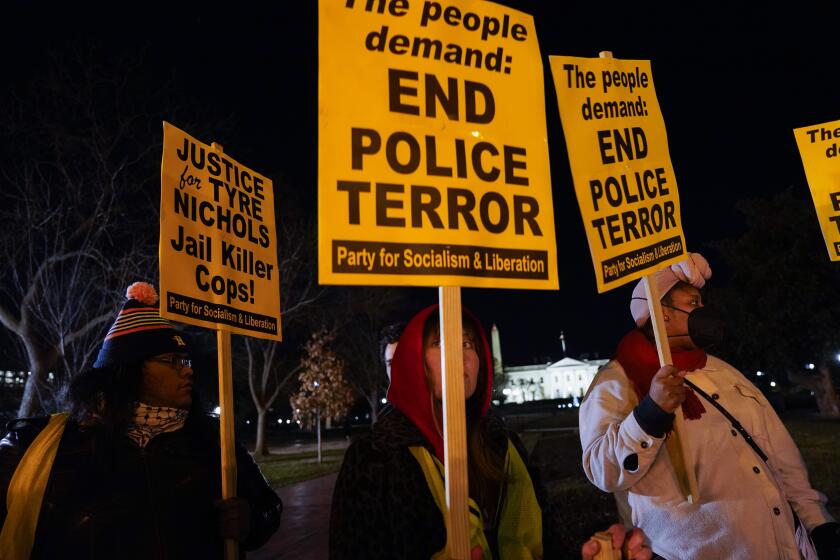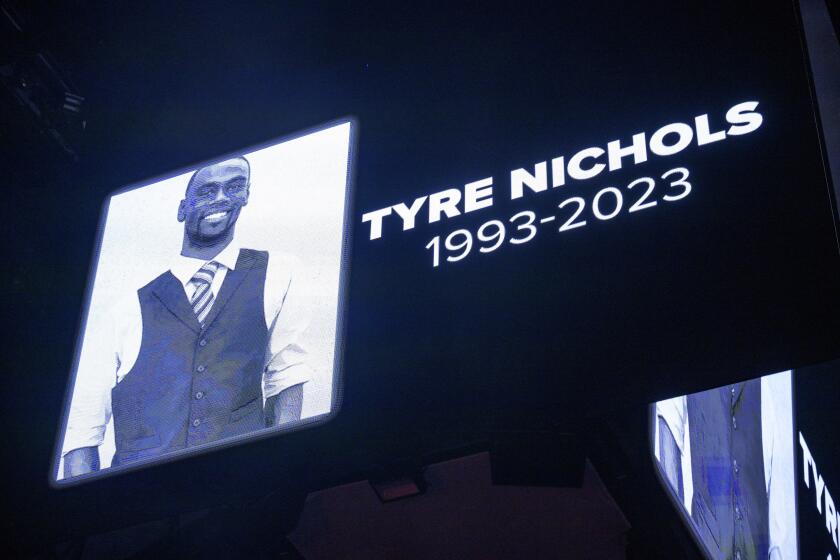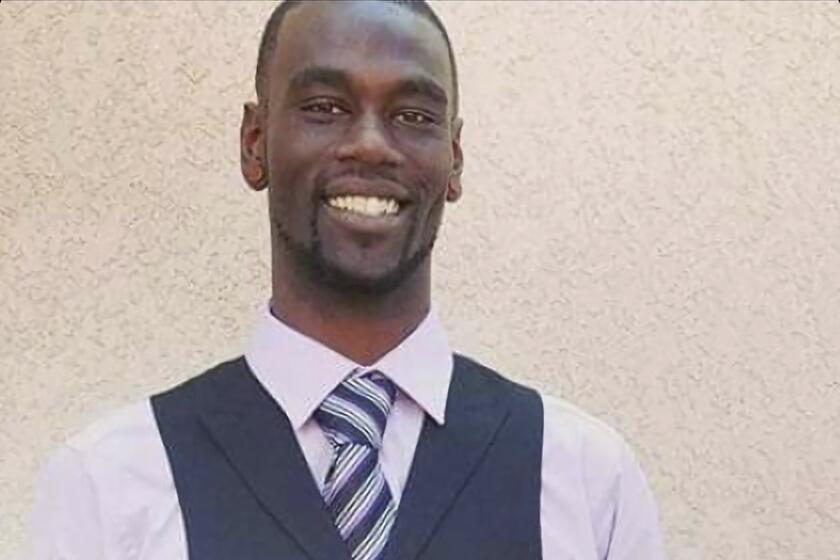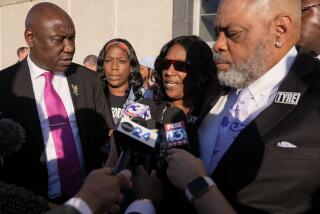Justice Department investigating Memphis police practices after Tyre Nichols death
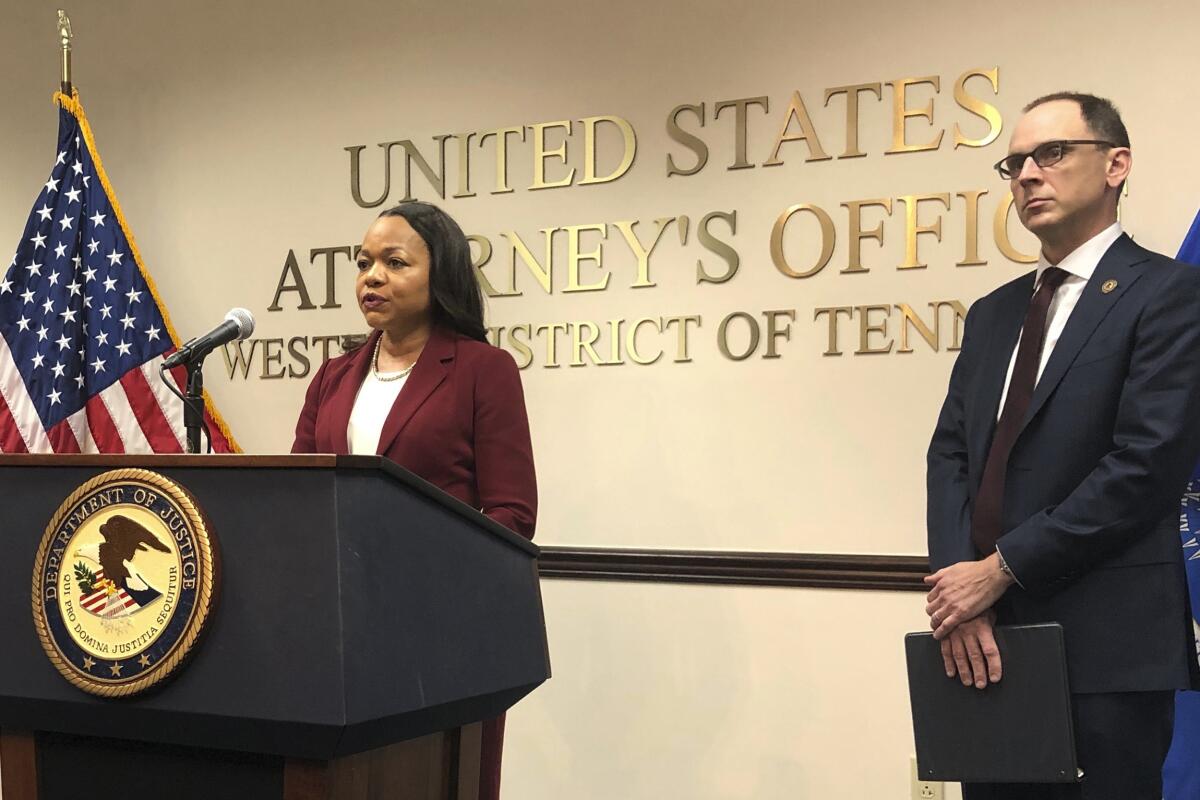
- Share via
MEMPHIS, Tenn. — The U.S. Department of Justice said Thursday it is investigating the patterns and practices of the Police Department in Memphis, Tenn., nearly seven months after the violent beating of Tyre Nichols by five officers after a traffic stop.
Assistant Atty. Gen. Kristen Clarke of the Justice Department’s Civil Rights Division made the announcement in Memphis. Federal authorities plan to look into the city Police Department’s use of force and stops, searches and arrests, and whether it engages in discriminatory policing.
Clarke said that in even in the majority-Black city of Memphis, the Police Department may be disproportionately focusing its traffic enforcement on Black drivers.
She said the investigation will look into the city’s government as well as its Police Department. She mentioned Nichols’ death, but said the investigation is not based on a single event and will not be into a single unit with the police agency. Nichols’ death added to a list of problematic killings of Black people by police in recent years and intensified national calls for police reform.
With five Black officers charged with murder in the beating death of Black motorist Tyre Nichols, what do we know about the role race plays in policing?
“The tragic death of Tyre Nichols created enormous pain in the Memphis community and across the country,” Atty. Gen. Merrick Garland said in a news release Thursday. “The Justice Department is launching this investigation to examine serious allegations that the City of Memphis and the Memphis Police Department engage in a pattern or practice of unconstitutional conduct and discriminatory policing based on race, including a dangerously aggressive approach to traffic enforcement.”
Clarke said the Department of Justice had received reports of Memphis officers escalating encounters with people in the community and using excessive force; using force punitively when they perceive someone’s behavior as insolent; and using force against people who are already restrained or in custody.
Rodney Wells, Nichols’ stepfather, told the Associated Press he hopes the investigation will lead to changes in the way police deal with Memphis residents.
“We’re moving in the right direction, trying to get some justice,” Wells said.
Clarke said investigators will ride along with Memphis police and speak with officers as part of the inquiry. She said the Justice Department had told the police chief and mayor about the investigation, adding that they had pledged to cooperate.
However, Memphis Mayor Jim Strickland said he was “disappointed that [his] request was not granted by the Department of Justice to discuss this step before a decision was made to move down this path.”
An autopsy report shows Tyre Nichols died of blunt force injuries to the head after he was beaten by Memphis police during a January arrest.
“I know they discussed the need for such an action with many other individuals. I hope the remainder of the process is more forthright and inclusive than it has been so far,” Strickland said in a statement.
Memphis Police Director Cerelyn “CJ” Davis said officers are expected to follow their training and department policies.
“While the officers involved in the Tyre Nichols case demonstrated no regard for these tenets, I am appreciative of the ... officers that continue to serve our city with integrity,” she said.
The five officers have pleaded not guilty to criminal charges including second-degree murder in Nichols’ beating after a Jan. 7 traffic stop and his death three days later. Caught on police video, the beating of Nichols, 29, was one in a string of violent encounters between police and Black people that sparked protests and renewed debate about police brutality and police reform across the U.S.
The five officers charged in the case are Black. So was Nichols.
The officers, part of a crime-suppression team known as Scorpion, punched, kicked and slugged Nichols with a baton as he yelled for his mother. The police chief disbanded the Scorpion unit after Nichols’ death.
Family and friends remember Tyre Nichols, a 29-year-old father who died after being beaten by police in Memphis.
In addition to the five officers who were fired and charged with murder, one white officer involved in the initial traffic stop has been fired. That officer will not face charges. Another officer, who has not been identified, also has been fired. An additional officer retired before he could be fired.
Three Memphis Fire Department emergency medical technicians were fired as well, for failing to render aid to Nichols. Two Shelby County Sheriff’s Office deputies who went to the location after the beating were suspended for five days for policy violations.
Activists have been calling for what is known as a pattern-or-practice investigation into Memphis police for years due to several incidents, including the fatal shooting of Darrius Stewart, a Black man who was killed by a white officer during a traffic stop in 2015, and the improper police surveillance of activists that resulted in a federal court order.
“This is a necessary step in ensuring the citizens of Memphis have our civil rights protected and that we’re moving beyond tacit political talking points” on changing the criminal justice system, said the Rev. Earle J. Fisher, a Memphis activist.
The Memphis City Council passed an ordinance earlier this year that outlawed so-called pretextual traffic stops for minor violations such as a broken tail light. But some activists say the ordinance is not being consistently enforced.
In June, a similar Department of Justice investigation concluded that Minneapolis police had systematically discriminated against racial minorities, violated constitutional rights and disregarded the safety of people in custody for years before George Floyd was murdered during an arrest.
And in March, the department found Louisville police had engaged in a pattern of violating constitutional rights and discrimination against the Black community, following an investigation prompted by the fatal police shooting of Breonna Taylor.
The investigations can take years — the Louisville and Minneapolis inquiries were both launched in April 2021.
Depending on their findings, the investigations can result in agreements that require reforms that are overseen by an independent monitor and are approved by a federal judge. The federal oversight can continue for years.
More to Read
Sign up for Essential California
The most important California stories and recommendations in your inbox every morning.
You may occasionally receive promotional content from the Los Angeles Times.
